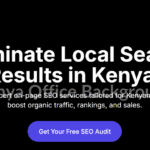On-Page SEO Optimization in Kenya
- Delivery Time2 Weeks
- English levelProfessional
- LocationUSA, United Kingdom, United Arab Emirates, New York, Nairobi, Kilimani, Kenya, Dubai, CBD Nairobi, Canada, Australia
Service Description
The cost of On-Page SEO Optimization in Kenya is 80000KES per month.Get On-Page SEO Optimization in Kenya at a price of 30000KES per month at Black Shepherd Technologies.
Boost your website’s search engine rankings and attract more organic traffic with our comprehensive guide to on-page SEO optimization. Learn essential strategies, from keyword research and content creation to meta tags and technical best practices. Discover how to improve your website’s performance and outrank the competition.
On-page SEO optimization is a cornerstone of a successful digital marketing strategy, especially for businesses operating within the dynamic and increasingly competitive Kenyan market. This holistic process involves fine-tuning various elements directly on a website to improve its ranking in search engine results pages (SERPs) and to provide a superior user experience. Unlike off-page SEO, which focuses on external signals like backlinks, on-page SEO is entirely within a business’s control, offering a powerful lever to enhance online visibility and attract targeted organic traffic. For a Kenyan business, the journey of on-page optimization begins with meticulous keyword research, which is a critical first step. This goes beyond simply identifying popular terms; it involves understanding the specific language, dialects, and search intent of the Kenyan audience. Tools like Google Keyword Planner and Google Trends, when set to the Kenya region, can reveal valuable insights into what potential customers in Nairobi, Mombasa, or Kisumu are searching for, including a mix of short-tail keywords like “web design Kenya” and long-tail phrases such as “affordable graphic design services in Nairobi.” The goal is to identify keywords that have a healthy search volume and a manageable level of competition, allowing a business to realistically compete for top rankings.
Once relevant keywords are identified, the focus shifts to strategic content creation and optimization. Content is the heart of any website, and for the Kenyan market, it must be not only high-quality and informative but also culturally and contextually relevant. This means creating content that addresses the specific needs, questions, and challenges of the local audience. The targeted keywords should be integrated naturally throughout the content, including in the page’s title tag, meta description, and header tags (H1, H2, H3). The title tag is particularly important as it’s the first thing a user sees in the SERPs, and it should be compelling, concise, and include the primary keyword. Similarly, the meta description, while not a direct ranking factor, is crucial for attracting clicks and should act as a compelling advertisement for the page’s content, often including a clear call-to-action. The use of header tags helps to structure the content, making it easy for both users and search engines to scan and understand the page’s hierarchy. The H1 tag should be a powerful headline that reflects the main topic and includes the primary keyword, while H2 and H3 tags can be used to organize sub-topics and incorporate secondary keywords.
Beyond the textual elements, on-page SEO in Kenya also involves a range of technical and user experience factors. Website speed is a paramount concern, as a slow-loading site can lead to a high bounce rate and negatively impact rankings. Given that many Kenyans access the internet via mobile devices, optimizing a website for mobile-friendliness is non-negotiable. This involves implementing a responsive design that adapts seamlessly to different screen sizes, ensuring that text is readable, and buttons are easy to click. Furthermore, image optimization plays a vital role in both page speed and accessibility. This includes compressing image file sizes without sacrificing quality, using descriptive file names, and adding keyword-rich alt text to help search engines understand the image’s content. A clean and logical URL structure, with short, descriptive URLs that include keywords, also aids in both user experience and search engine crawlability. Internal linking is another powerful on-page strategy. By creating a strong internal linking structure that connects related content, a website can guide users and search engines through its pages, distributing link equity and enhancing the authority of key pages. Finally, for Kenyan businesses, leveraging local SEO is a game-changer. This involves optimizing a website’s content and meta data with location-specific keywords (e.g., “bakery in Westlands, Nairobi” or “plumbers in Mombasa”), as well as ensuring that the business’s Google Business Profile is fully optimized, encouraging reviews, and using Google Posts to maintain a dynamic and visible local presence. These collective on-page efforts, when strategically implemented, form a robust foundation that enables a Kenyan business to effectively compete online, attract its target audience, and convert visitors into loyal customers.
The final pillar is technical on-page optimization, which ensures a website’s foundation is solid and accessible. Given that a large portion of the Kenyan population accesses the internet via mobile devices, mobile-friendliness and website speed are non-negotiable. A site must have a responsive design that functions flawlessly on smartphones and tablets, with fast loading times to prevent users from bouncing. This involves compressing images without losing quality, minifying code, and leveraging browser caching. Image optimization is a distinct element in itself: using descriptive, keyword-rich file names (e.g., “Mombasa-sandy-beach.jpg”) and alt text not only helps search engines understand the image but also makes the site more accessible. Furthermore, a clean, logical URL structure, a robust internal linking strategy to guide both users and search engines, and the use of schema markup (structured data) are critical. Schema can help a local business get rich snippets in search results, displaying information like star ratings, operating hours, and location directly in the SERP, which significantly increases visibility and click-through rates. By meticulously attending to these on-page elements, a Kenyan business can create a highly-optimized website that not only ranks well but also delivers a superior, trustworthy, and locally-relevant experience to its target audience.
Certainly. To provide a more comprehensive and detailed description of on-page SEO optimization for the Kenyan market, let’s expand on the key pillars, adding more depth and specific examples that are particularly relevant to the region.








